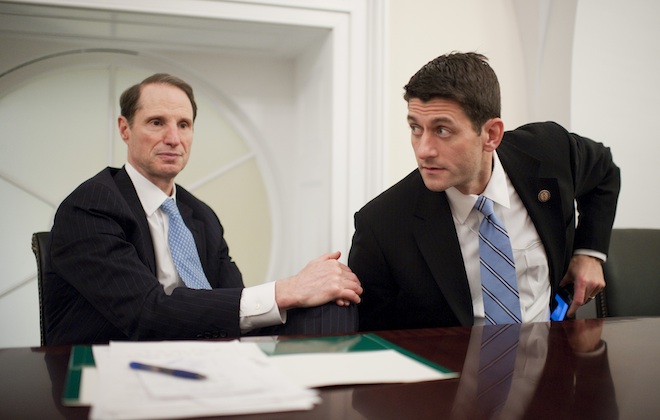The consensus among GOP leaders, and really leaders of both parties, is that the two biggest issues dividing the parties — how much wealthy Americans should pay in taxes, and how the health care safety net should be structured — will be decided by the elections in November.
The implication is that if Republicans win convincingly, the country will have provided them a mandate to further reduce taxes and roll back Medicare, Medicaid and the health care law.
But what happens if President Obama and the Democrats walk away with the prize? Will Republicans agree to increase, fairly significantly, the amount of money flowing into the Treasury?
Er, um. Maybe.
At a breakfast roundtable hosted by the Christian Science Monitor, the LA Times‘ David Lauter pressed House Budget Committee Chairman Paul Ryan on this key point.
After a long digression, Ryan wouldn’t hold himself or his party to its own standard.
“You know you can’t solve the budget problem by raising taxes,” Ryan objected.
“But the more you raise taxes, the less you have to cut Medicare presumably,” Lauter countered.
In the longer term, though, cutting health care programs will be the key, Ryan argued. “The numbers are just so awesome, the spending trajectory is just so enormous,” he said, implying that at some point his approach to Medicare and other programs will be inevitable.
“Your budget calls for revenue at 18 or 19 percent of GDP, he’s calling for revenue in roughly 22 percent of GDP,” Lauter objected. “If he wins, do you say, ‘well OK the country’s chosen, we’re going to go to 22 percent of GDP,’ or do you just say the mandate only works if we win.'”
Ryan wouldn’t say.
“It would be great if he would join the bipartisan consensus on tax reform that’s occurring. He’s way on the left on this,” Ryan said. “What I’d like to think is after the election perhaps — the way I’d look at the President’s current policies, he can’t run on his record, he’s not changing his vision or his tact so he’s running on class division, on envy and resentment. This budget’s basically a campaign document. Maybe he would think twice and think about joining the bipartisan consensus that’s emerging on tax reform.”
“I hate to think about that scenario in the future,” Ryan said chuckling. “I’d like to think about the scenario I painted.”
When the outcome in November is clear, Congress will have to work at a rapid clip to deal with the looming expiry of the Bush tax cuts, and over a trillion dollars of automatic spending cuts scheduled to take effect on January 1. Ryan said he imagines that Congressional leaders will have different contingency plans ready to go depending on who wins — but that it might be necessary to punt all of these fiscal issues into early 2013 to buy enough legislative running room to pass a comprehensive solution.
“A lot of us think about this. A lot of us are preparing — are thinking through policy things,” Ryan said. “We send lots of stuff to CBO to get scored. We’re sort of piling our database of ideas to more or less have things ready to go. But will we have, you know, legislative text ready to rock and roll? I don’t know the answer to that question. Will we have ideas that are fairly well advanced that can be pretty quickly implemented.”










